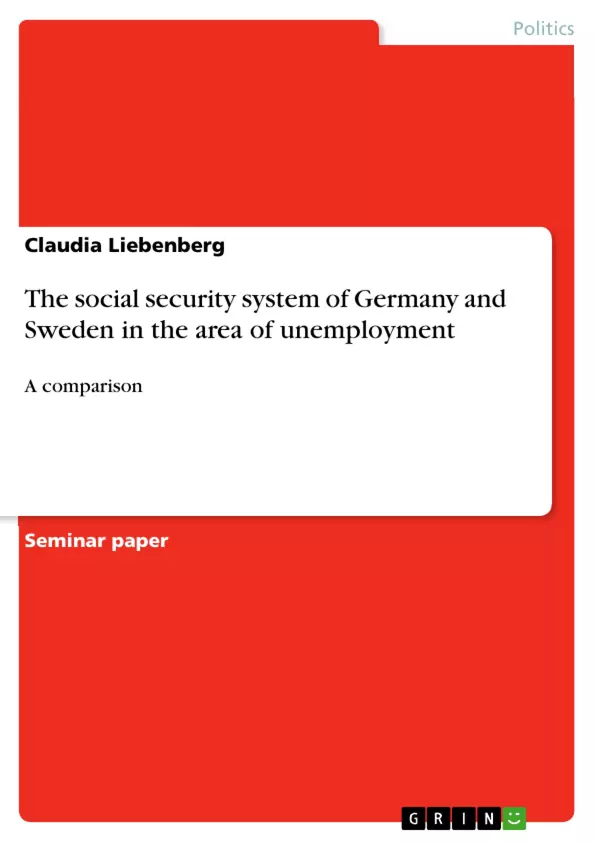Why does a comparison of different social security systems with in the European Union(EU) make sense? Social security systems have to change because the underlying conditions are changing: globalisation, technological innovation,the disappearance of borders in Europe and demographic development are challenges the social systems must respond to.
Social systems have to adapt. But how and in what direction should they evolve: public administration or private insurance; financed through taxes or through voluntary contributions; large amount of benefit in order to ensure social peace and to streng then the consumer or low benefit to save money and to encourage selfactivity? Inorder to answer these and other questions it may be rewarding to examine the different social systems and to learn from the most successful ones.
Inhaltsverzeichnis (Table of Contents)
- European Cohesion Policies
- List of abbreviations
- 1. Introduction
- 2. Welfare Regimes
- 3. The social security system in the area of unemployment in Germany
- 3.1. Unemployment Insurance (SGB III)
- 3.1.1. Organisation
- 3.1.2. Funding
- 3.1.3. Principles
- 3.1.4. Entitlement
- 3.1.5. Services and Benefits
- 3.2. Tax-funded benefits (SGB II)
- 3.2.1. Organisation
- 3.2.2. Funding
- 3.2.3. Principles
- 3.2.4. Entitlement
- 3.2.5. Services and Benefits
- 3.1. Unemployment Insurance (SGB III)
- 4. The social security system in the area of unemployment in Sweden
- 4.1. Organisation
- 4.2. Funding
- 4.3. Principles
- 4.4. Entitlement
- 4.5. Services and Benefits
- 5. Comparison of the unemployment systems in Germany and Sweden
- 5.1. Similarities
- 5.2. Differences
- 6. The two unemployment systems in the context of welfare regimes
- 7. Conclusion
- Bibliography
Zielsetzung und Themenschwerpunkte (Objectives and Key Themes)
This paper aims to compare the social security systems of Germany and Sweden in the area of unemployment, specifically focusing on assistance for those who have lost their jobs. It examines the evolution of social security systems within the European Union (EU) and explores the challenges posed by globalization, technological innovation, and demographic development. The paper analyzes the different welfare regimes of Germany and Sweden, focusing on their approaches to labor decommodification, entitlement, and funding. Ultimately, it seeks to understand how the respective welfare regimes are reflected in the specific systems of unemployment benefits.
- Evolution of Social Security Systems in the EU
- Comparison of Welfare Regimes in Germany and Sweden
- Analysis of Unemployment Benefits in Germany and Sweden
- Relationship Between Welfare Regimes and Unemployment Benefits
- Challenges and Adaptability of Social Security Systems in a Globalized Context
Zusammenfassung der Kapitel (Chapter Summaries)
The paper begins with an introduction that highlights the need for comparing different social security systems in the EU due to changing societal conditions. It introduces the key themes of the paper: the evolution of social security systems, the differences between welfare regimes, and the impact of these regimes on unemployment benefits.
Chapter 2 delves into the concept of welfare regimes, using Gøsta Esping-Andersen's framework of three worlds: corporatist, social democratic, and liberal. It discusses the essential criteria for categorizing regimes and characterizes Germany as a corporatist welfare state and Sweden as a social democratic welfare state.
Chapter 3 focuses on the social security system in the area of unemployment in Germany, presenting two main systems: unemployment insurance (SGB III) and tax-funded benefits (SGB II). It provides an overview of the organization, funding, principles, entitlement, and services offered by each system.
Chapter 4 examines the social security system in the area of unemployment in Sweden, detailing the organization, funding, principles, entitlement, and services provided by the system.
Chapter 5 compares the unemployment systems in Germany and Sweden, highlighting both similarities and differences in their approaches. This comparison is then contextualized within the framework of welfare regimes in Chapter 6.
Schlüsselwörter (Keywords)
The main keywords and focus topics of this paper include: social security systems, European Union, welfare regimes, corporatist, social democratic, unemployment benefits, Germany, Sweden, unemployment insurance, tax-funded benefits, entitlement, funding, services, comparison.
- Citar trabajo
- Claudia Liebenberg (Autor), 2009, The social security system of Germany and Sweden in the area of unemployment, Múnich, GRIN Verlag, https://www.grin.com/document/161259



